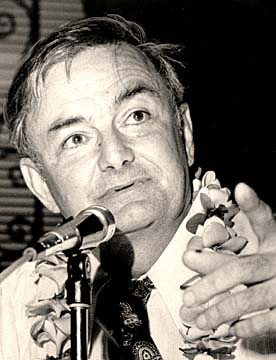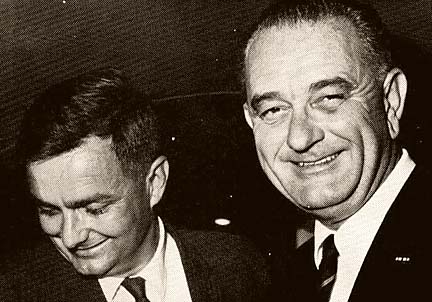
[ HAWAII'S HISTORY]
Tom Gill takes a question in Honolulu.
Simple justice
A one-term Hawaii congressman
helped craft and pass the landmark
1964 Civil Rights Act
Forty-two years ago, a brash young freshman congressman from the nation's newest state blew into Washington, D.C., and in only two years helped reshape America's future. Through his words and tireless effort, he helped the nation finally realize the founders' dream of equality for all, regardless of skin color or origin. The one-term wonder was Thomas Ponce Gill, who drafted a key section of the landmark legislation and shepherded its passage through the House. Gill is being honored today by the Dr. Martin Luther King Jr. Coalition-Hawaii.
Early life
Born in Honolulu in 1922, Gill grew up during the Great Depression, fought in World War II and began his public career during the atomic age.After the war, people around the world were fighting to throw off the mantle of colonialist domination. The gravest domestic issues facing the United States were social rather than economic; a great struggle to assure everyone their full rights as citizens was under way.
In Washington, Congress had rejected President Harry S. Truman's civil rights program of 1948, but the president's effort had established civil rights as a national issue.
The effect of the movement in multi-ethnic Hawaii was profound. Long-standing racial barriers already were dropping. By 1946, Chinese and Filipinos had gained naturalization and immigration rights. In 1952, Japanese, Koreans and Samoans became eligible for citizenship. Almost overnight the electorate changed. No longer could Caucasians and part-Hawaiians control elections. The base upon which the Republican Party had stood for more than 50 years was crumbling.
Gill was among the builders of the emerging Democratic Party of Hawaii. He served as the county Democratic campaign and committee chairman for the 1952 and 1954 elections, when the "Democratic Revolution" finally ended Republican political control of the islands.
While acting as Territorial Senate counsel and administrative aide to the House speaker, Gill helped write social, economic and environmental legislation. But the measures were considered too liberal by then-Gov. Sam King, a Republican, and he vetoed the majority of the bills.
Undeterred, Gill continued the political fight as a member of the Territorial Legislature, and, after statehood, as majority floor leader in the first state Legislature. His next stop was Congress.
Gill with President Lyndon B. Johnson in 1964.
On Capitol Hill
Gill arrived in Washington in January 1963 and immediately stood out from the crowd of freshmen congressmen, not only for his above average height, but his work ethic, determination and commitment to the cause of equal rights. Appointed floor manager for the Civil Rights Bill, it was his job to move the bill through the House of Representatives. He fearlessly took on the bill's detractors. The quality that some perceived as arrogance in the brash newcomer came from knowing who he was and what he was about.But crusaders like Gill were disappointed with support from above. Fearing the loss of the few southern allies they had, President Kennedy and his brother Bobby, the attorney general, had decided to move civil rights by executive and not legislative means. Publicly they spoke and acted boldly, but went soft on support of the bill inside the halls of Congress. This set the stage for conflict between the Kennedys and the idealistic young freshman. Gill felt that his commitment to civil rights was why he was elected and there should be no compromise. Gill let the Kennedys know that he would not back down. And he did not. He worked harder than ever to fulfill his promise to constituents.
The Gill Bill
Early in 1963, Gill was tasked with writing a portion of the Civil Rights Bill. Title VI banned organizations or programs receiving federal funds from discriminating on the basis of race. The opening section of Title VI reads: "No person in the United States shall, on the ground of race, color, or national origin, be excluded from participation in, be denied the benefits of, or be subjected to discrimination under any program or activity receiving federal financial assistance." In Hawaii, it was known as the Gill Bill.In 1963, a few weeks after the race riots in Birmingham, Ala., President Kennedy sent a draft of the Civil Rights Bill to Congress. He concluded his message with these words:
"I ask you to look into your hearts -- not in search of charity, for the Negro neither wants nor needs condescension -- but for the one plain, proud and priceless quality that united us all as Americans: a sense of justice.
"In this year of the emancipation centennial, justice requires us to insure the blessings of liberty for all Americans and their posterity -- not merely for reasons of economic efficiency, world diplomacy and domestic tranquility -- but, above all, because it is right."
About the section of the bill that Gill had written, Kennedy said, "Title VI was simple justice."
The president was assassinated before he could see the bill become law.
Final passage
The succession of Lyndon Johnson to the presidency brought a new sense of urgency and determination to the fight for civil rights. As a southerner himself and the former Senate majority leader, Johnson held legendary influence in Congress.Several southern lawmakers confided to Gill that while they personally favored the bill, publicly supporting it would be political suicide. Though they could not vote for it, they told Gill, they would not vote against it either. Gill knew these lawmakers would simply not be present for the vote. The House passed the bill Feb. 10, 1964, by a vote of 290 to 130.
Opponents from both parties lamented the bill's passage. Arizona Sen. Barry Goldwater, a Republican, called it "unconstitutional." Sen. George A. Smathers, a Democrat of Florida, predicted that if a dictator ever gained the highest office, "that man will ride to power on the influence and power he will get under Titles VI and VII."
Sen. Hubert Humphrey of Minnesota, the Democratic Senate floor manager of the bill, said the bill was "the greatest piece of social legislation of our generation."
After the roll call, several thousand people gathered before the floodlit Capitol to applaud the Senate Democratic leader, Mike Mansfield of Montana, and the Republican leader, Everett Dirksen of Illinois. Dirksen had been instrumental in shaping the com- promise that the Senate passed after a 78-day filibuster.
Mansfield said that there was "no room for unwarranted sentiments of victory," and that there should be "no sense of triumph but a profound humility" upon the part of those who had labored and voted for the bill.
Forty years later, we give thanks to our own Tom Gill who labored long and hard to see the Civil Rights Bill become law. Today we would call Gill a "change agent," but in truth, he was a hero who should be recognized. His story is our story; and it must be told.
Marsha Joyner is a former president of The Dr. Martin Luther King, Jr. Coalition-Hawaii, and as a member of SNCC, The Student Non-Violent Coordinating Committee, took part in the civil rights movement.
— ADVERTISEMENTS —
— ADVERTISEMENTS —

